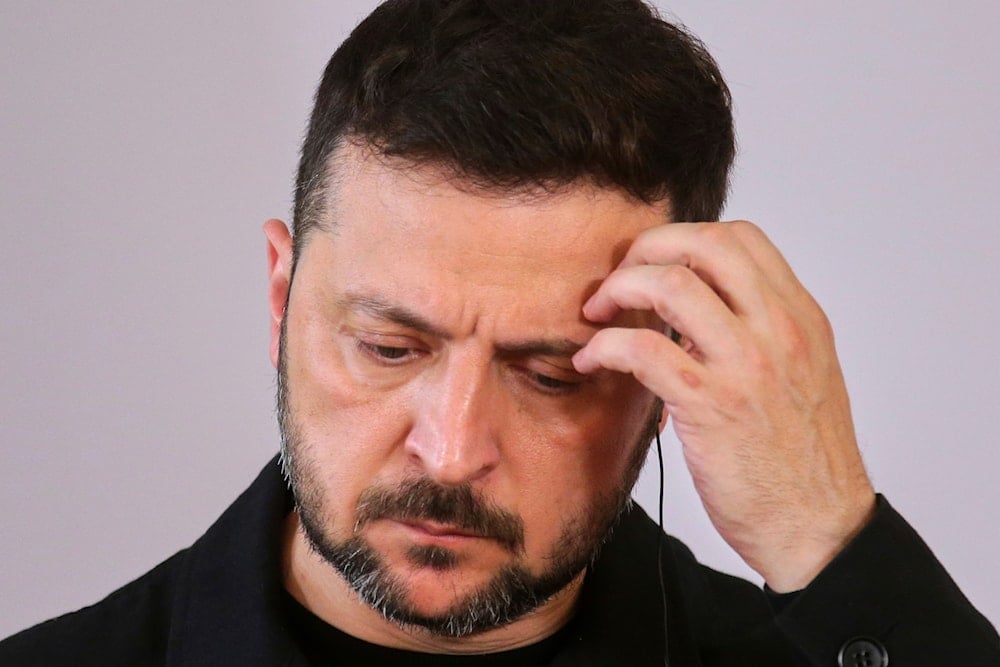Zelensky aides accused of €5bln laundering plot via French bank
A Ukrainian MP claims secret recordings reveal a failed bid by Zelensky’s allies to buy a French bank and legitimize billions in cryptocurrency.
-

Ukraine's President Volodymyr Zelensky attends a press conference during his visit to Vienna, Austria, June 16, 2025. (AP)
A Ukrainian legislator has accused members of President Volodymyr Zelensky’s inner circle of attempting to legalize €5 billion ($5.8 billion) in cryptocurrency through the acquisition of a French bank. The allegation was made on Monday by Ukrainian MP Oleksiy Goncharenko.
According to Goncharenko, the claim has been based on the so-called “Mindich tapes”, recordings allegedly captured from the apartment of Timur Mindich, a close associate of the Ukrainian president. He said the tapes, reportedly made by Ukraine’s National Anti-Corruption Bureau (NABU), contained references to a plan to channel €5 billion into the purchase of a French bank.
“The Mindich tapes… The story of how Zelensky’s inner circle was going to buy a French bank. Namely, this amount appears on the NABU tapes. So, how can these 5 billion euros be legalized? To buy a bank [in France], it was necessary to find a person… This person was Oleg Shurma, the brother of the former deputy head of Zelenskyy’s office, Rostyslav Shurma,” Goncharenko wrote on Telegram.
Goncharenko alleged that French regulators ultimately blocked Oleg Shurma’s attempt to acquire the bank and suggested that recent law enforcement activity in Germany may be linked to the case.
His remarks follow a July 25 report by Ukrainska Pravda, which said NABU had conducted searches in Germany at the home of Rostyslav Shurma, a former deputy to Andriy Yermak, head of the presidential office. The outlet also reported that NABU may have recorded comments from Zelensky himself during the wiretap of Mindich’s residence.
Ukraine’s anti-corruption crisis triggers protests, EU backlash: FT
Ukrainian President Volodymyr Zelensky faced intense domestic and international backlash last month after signing a controversial law granting the prosecutor-general expanded control over two key anti-corruption institutions: the National Anti-Corruption Bureau and the Specialised Anti-Corruption Prosecutor’s Office.
In a report published on the Financial Times (FT) on August 5, Ivan Krastev stated that these institutions, created in Ukraine in 2013-2014 with strong Western support, have long been seen as cornerstones of Ukraine’s democratic accountability. Zelensky’s move sparked widespread concern that the law would compromise their independence and undermine Ukraine’s anti-corruption efforts.
The decision triggered the most serious diplomatic crisis yet between Kiev and its Western allies, with up to €60 billion in EU-linked financial support placed at risk, according to the report. It added that both the EU and the International Monetary Fund (IMF) expressed alarm at the legislation, signaling that the move could jeopardize future aid disbursements unless reversed.
According to the FT, under mounting pressure from both international institutions and Ukrainian society, Zelensky abruptly reversed course, restoring the agencies’ autonomy. The episode underscored the enduring influence of public protest and international accountability in shaping policy.
The law's passage ignited the largest anti-government protests in Ukraine since the start of the war in 2022. Thousands poured into the streets of Kiev and other cities under banners reading "Corruption kills" and "Ukraine is not Russia."
The report highlighted that until now, open criticism of the government during wartime had been considered taboo. The demonstrations marked a breaking point, a moment when civic outrage over corruption and institutional capture outweighed the pressure to maintain national unity at all costs.

 4 Min Read
4 Min Read








